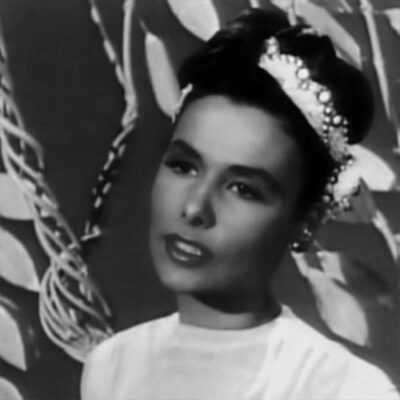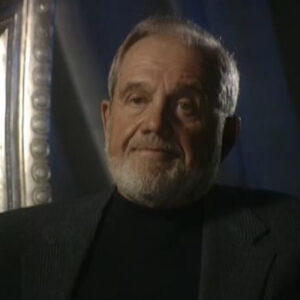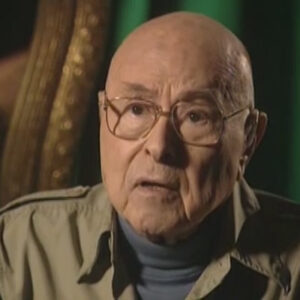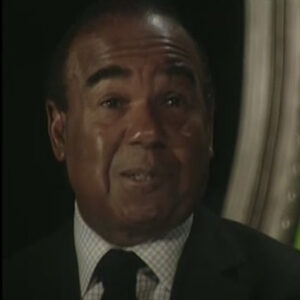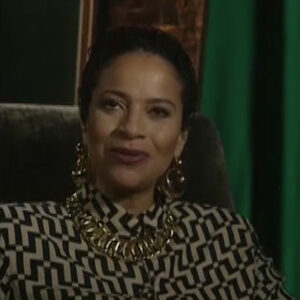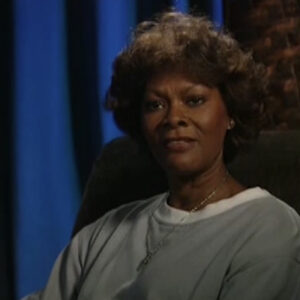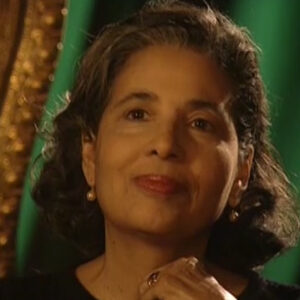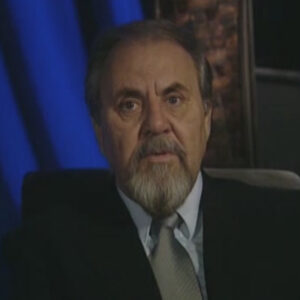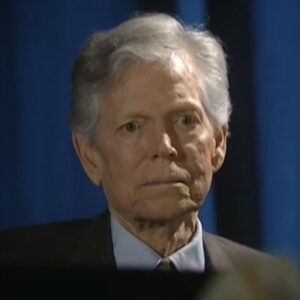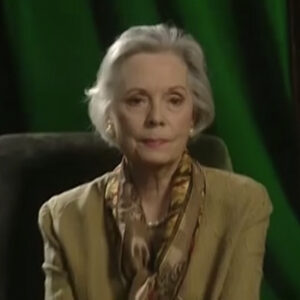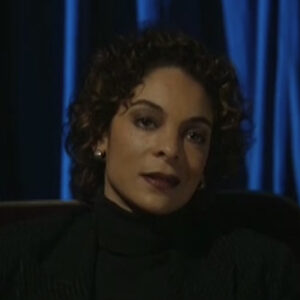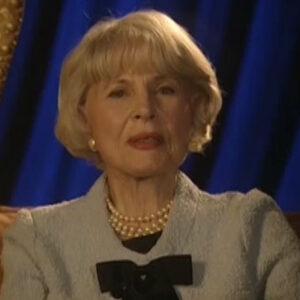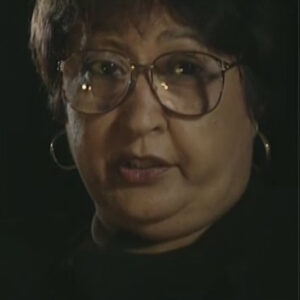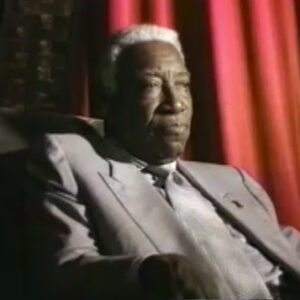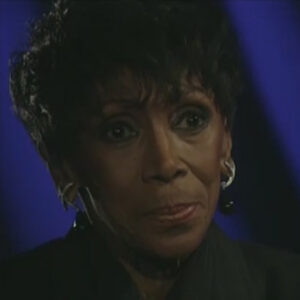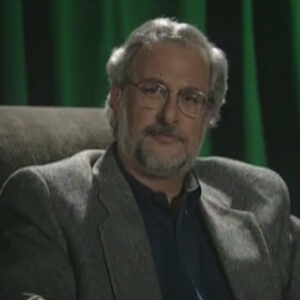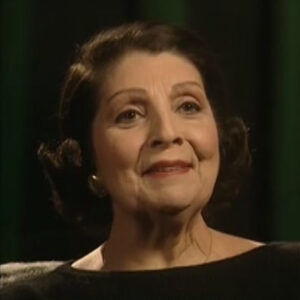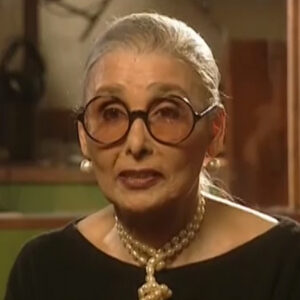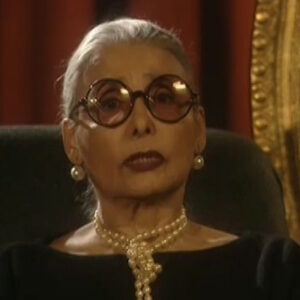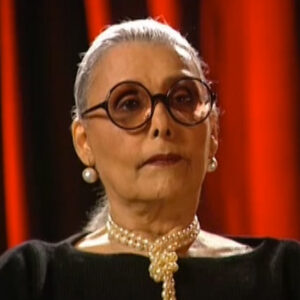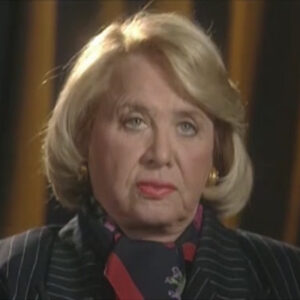Speaker I want to go back to the old days of Hollywood. And tell me what you how you first encountered Lena Horne.
Speaker Well, the old days in Hollywood, you mean the old days when I was watching movies before I came out to the movies, I used to see Lena in the old MGM musicals, and I was crazy about her. I really admired her a lot. I think I think I had a little crush on her, but I didn’t come out here until 1947, so I wasn’t a part of that group at MGM in those days.
Speaker I didn’t know the people and I only knew them by the screen. And that’s how I was introduced to Lena.
Speaker What was she like up there on that screen?
Speaker She was a dinger. She was beautiful and she had such energy and vitality and she could sing like a bird. So she really won an audience over and she certainly won me over.
Speaker Did you ever get to see her perform in nightclubs? What did you get to see her perform in nightclubs?
Speaker No, I didn’t. I never did. The only time I saw Leanne, it was on the screen. And in later years, I didn’t get to see her one woman show either, which I’d heard so much about. So I missed. I think I miss the real Lena. I just saw the image.
Speaker What was the reputation of MGM at that time?
Speaker Oh, it was a home and I just needed to say and was the reputation of MGM was the home of the greatest musicals ever made. And as the years have gone on, it’s certainly proven to be that they’re just great. After the death of Gene Kelly the other day, they’ve been running MGM musicals that he did and they were just fabulous. But if you wanted to see a good musical, go to MGM.
Speaker You know, when we were outside, we were talking a little bit about the the. That Gene Kelly was part of.
Speaker Oh, in those days I heard about it, I wasn’t a part of it, but I heard that every Saturday they gather at Kelly’s house, the whole musical group. They were a very close knit group. I had heard they stuck together and they worked together and they socialized together.
Speaker Now moving forward to the death of a gunfighter.
Speaker What was the part? Well, first of all, how did I get involved in the production?
Speaker In 1968, I was going to do a little movie at Universal called Death of a Gunfighter, a little Western. And we were looking for a leading lady. And one night at home, an executive at Universal, Jennings Lang called me and said, What would you think of Lena Horne? And without a second’s beat, I said, Great, see if you can get it. So that’s how she happened to be approached to do the part and death of a gunfighter. And I was out of my mind after admire so many years to get to work with her, who was a real treat for me. So that’s that’s how it came about that she was asked to do the part. It was not written for an African-American lady. It was just a part, just the lady. And I think it was one of the few times where an actress was hired for a part and there was no indication of color or anything else. It was just the leading lady.
Speaker I noticed that in the film. Her last name was Pantalla, which seemed to indicate that maybe she could be Spanish or something like that.
Speaker I don’t know. I don’t even remember the name of it. Oh, I remember Lena.
Speaker Was there any opposition to having Lina?
Speaker What was that?
Speaker Was there any opposition to the other were a couple of people involved in the production who didn’t want her because she was black and Jennings and I said, we want her. And we went ahead with Lena.
Speaker What what kind of part did she play, what was her character?
Speaker I don’t remember that movie very well.
Speaker I believe that, but but it was just a little Western and she played a lady of the town and I think we finally got married and it was just a straight leading lady part and your average Western. And she was terrific. I remember when she first came out to do it, I was so happy that she accepted the part. I met her down at the old Sportsman’s Lodge. I went over to meet her and to run over the script. So that day I was very nervous because I was going to meet this lady that I admired so long and she was a little nervous.
Speaker So we were both a little nervous. But we spent about an hour or so together just reading lightly through the script and it worked out great. Now, did you go off and lie before any big things just read together always before we did a scene, we would run it by ourselves, we’d run it in her dressing room, in my dressing room, just run through it easily. The first day or two, she was a little uptight and a little nervous. But after a couple of days, I was sliding on ice. It was great.
Speaker Was there any particular response to a marriage see?
Speaker No, not really. There was, but I think there was a response to the director we had at the time, he didn’t want to feel too too happy about it. But fortunately, he left the picture shortly after. And Don Siegel, a friend of mine, finished the picture. If you could just rephrase that answer to tell me, you know, the director wasn’t too crazy about the marriage, the wedding, but then the director we had at the time, I don’t think was too crazy about the marriage, but he had his own problems and he didn’t stay too long in the picture. A friend of mine, Don Siegel, finished it.
Speaker Was there any particular nervousness on Lena’s part before shooting that scene?
Speaker No, it was just two actors doing their job.
Speaker Now, I have had many speaking parts, I don’t think so, I think this was probably one of her first just straight acting jobs, no singing involved. It was just a leading lady in the Western. And I think it was probably the first time that she just played a straight part.
Speaker Do you have any favorite moments or stories about working with her and working with Lena?
Speaker No. Strange. I kind of had a lot of outside distractions on this picture, and we just did our work and and we had a good time doing it and we had a great relationship doing it. And I really can’t recall any particular things that would be interesting to anybody other than just a day’s work.
Speaker Well, I mean, you were a very experienced actor. Let’s just feet wet. Was there any particular tips?
Speaker No, no. She was a good actress. She was just an instinctively good actress. As you could see from the early things that I had seen at Metro and the musicals. And there wasn’t anything you, Darlene, that she just did it instinctively. And it was terrific.
Speaker When you met in person after all this time, did she what was she like, did she live up to the fantasy that you had?
Speaker She was just a nice, simple, honest person. I couldn’t have been more pleased and happy. She was just a nice lady. No side, no airs, just a terrific lady. And I found her to be that all through the six or eight weeks that we worked on this picture, she was one fine lady.
Speaker Did you ever get to experience or a great sense of humor? Hmm. Did you ever get to experience a great sense of humor?
Speaker Yeah, here and there. You know, I can’t tell any particular incidents, but she had a lot of humor, and that’s what made her a fascinating woman.
Speaker Do you recall ever. The two of you are socializing with the crew or I guess any social events that that.
Speaker No, not really. There were no socializing. We didn’t have a party after the picture. There were no socializing. Everything was on the set and on the stage. The only time I socialize where there was one time, about six years later in Paris, I was making a picture called the Orient Express and Sidney Lumet was directing it. And her daughter Gail was married to Sidney at the time and Lena was visiting. So we had lunch at the Plaza. Hartney And I think that was our only socializing since I’ve known Lena.
Speaker It is a very elegant lady having lunch at the Plaza Athenee.
Speaker Yeah, she finished writing.
Speaker Actually, that’s when it was announced in the pirates. Well, let me just ask you, in terms of llena, you got to see Lena with Gail in Sydney, I imagine. What was the dynamic? Very homey.
Speaker She was a homely lady. Seems like she was very domestic with all the other fine things about her, you could see she was a very homely type lady.
Speaker A lot of folks call her mama, did she do any mama mama in on the set? Yeah, Mama Mina. If you could just say that you like to talk to a lot of us, she was like Mammoliti. Yeah, I’m Aleena.
Speaker I really think we just have to. Were you? Yes. Also had an airplane when I was answer about the Paris answer and when Paris was it was an airplane over there. OK. OK. Would you mind telling me again about dining with her in Paris, I know about doing the Orient Express.
Speaker Oh yeah. OK, we have an airplane going off, but I hear one now some.
Speaker I think the only socializing we ever did was about six years after we made this death of a gunfighter, I was doing a picture called the Orient Express in Paris with Sidney Lumet. And Sidney was married to Lena’s daughter Gail at the time. And Lena was visiting Gail in Sydney. So we had lunch one day at the Plaza. That was our only social time.
Speaker Now, Lina was living in a war, moved up to Santa Barbara, I believe, after she had the. Difficult spate of tragedies with the three men in her life died, did you see her at all when she was you know, I heard that she had moved up, but she was very reclusive.
Speaker I think, as I recall, I sent her a couple of Christmas cards and we never got together. I never I knew where she was. I knew the house, but we never got together. And I really regret that because I think she was here about two years and I never saw her up here.

